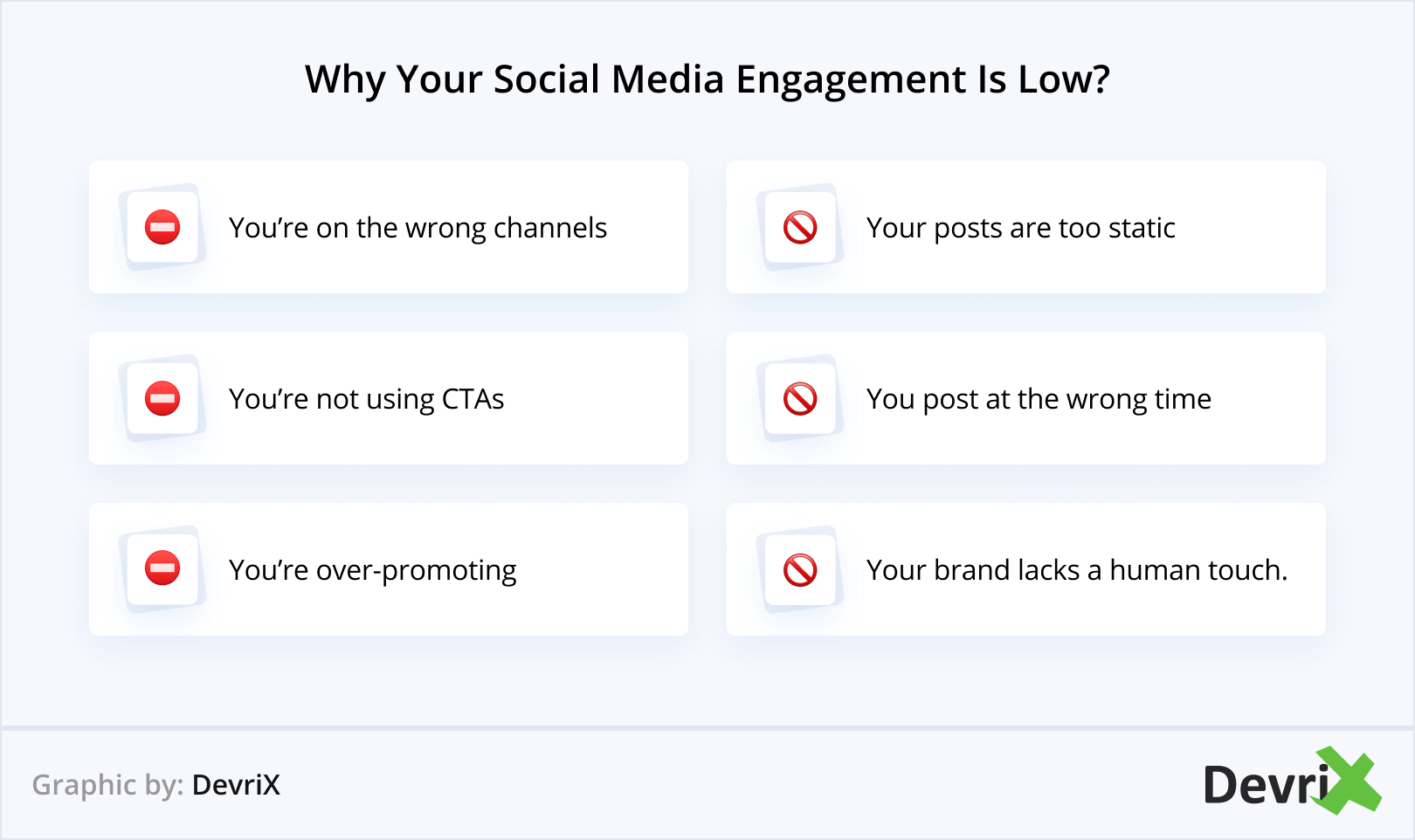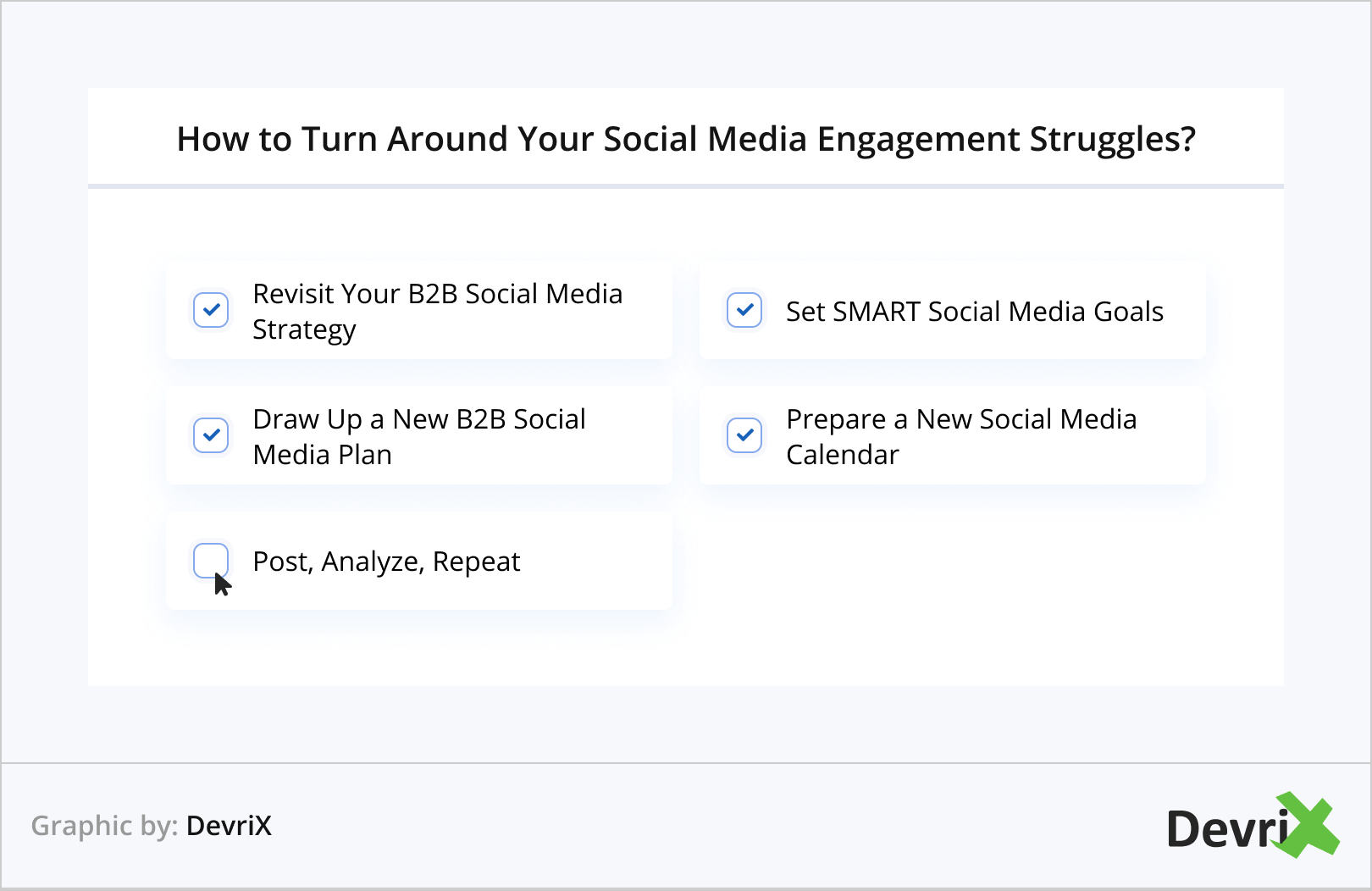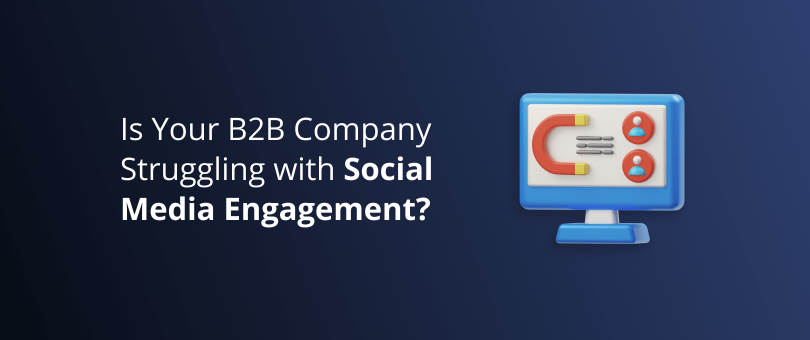B2B social media marketing is here to stay, yet there’s no denying that finding the right path can be tricky. The digital environment has so much to offer to business-to-business brands – interactions with audiences, trust-building, and fostering meaningful relationships to name a few. However, maintaining a strong brand presence has its ups and downs, and the telltale sign that things might not be going so well is low social media engagement.
People use social networks because they want a two-way experience. They seek to connect, bond, learn something new, share their opinions, and find products/services that help solve their problems. If brands can deliver on this, they will be one step closer to finding a way to the customer’s heart.
Building strong engagement not only means that your brand is popular, but that your content resonates with your followers. Furthermore, it may signify that you are becoming a thought leader and making an impact in your industry. This is equally important to your current and prospective clients and can lead to a myriad of sales opportunities.
Businesses work hard to increase engagement of their B2B social media posts, yet many often find themselves lost in what to do next, or are stuck repeating the same old strategy.
In this article, we’ll be outlining the signs of a low social media engagement, and providing some practical tips to help you get back on track.
What Is B2B Social Media Engagement?

Social media engagement is a measurement of how often your audience interacts with your brand, as well as how effective those interactions are in helping you reach your business goals.
This Is calculated by taking into account specific actions performed on the different platforms in your omnichannel strategy. These actions are relevant to your brand’s visibility and the audience’s awareness.
The key performance indicators of social media engagement include likes, shares, comments, retweets, clicks, mentions, saves, and so on. They can give you an insight into how well your content is performing, including, but not limited to:
- How well does it resonate with your audience?
- Does it enable them to learn about your brand and company?
- Does it create a sense of community and belonging?
- Does it really help people find the information that they are looking for?
Why Is Social Media Engagement Important?
Thoughtful and meaningful actions increase brand reach, boost customer trust and advocacy, and help you build stronger relationships. They are the greatest indicator of B2B social media success. While social media engagement happens as an effect of likes, comments and shares, it’s important that you pay attention to the quality of those interactions, not merely the quantity.
For instance, you can have thousands of followers, a good amount of whom like your posts. However, if they only leave single-word comments or none at all, and they don’t share your posts or mention your brand, then that’s an indication that they are not as interested in you as you’d like them to be.
The lower your social media engagement is, the less your organic reach will be, and the poorer your online status will become.
Reasons for a Low Social Media Engagement

If you are sharing posts but very few people like, comment, or share them, this means that somewhere along the way your B2B social media strategy is failing.
Here are a few reasons why this could be happening.
- You’re using the wrong social media platforms.
- There are few or no call-to-actions (CTAs) in your posts.
- You are possibly over-promoting your business, but providing no value.
- You don’t combine different types of posts – news, offers, education, humor, etc.
- You are posting at the wrong time of the day/week.
- Your brand is lacking a human touch.
If you find yourself making some of these mistakes it’s time to step back and reassess your social media plan. Let’s have a look at how to do that.
How to Turn Around Your Social Media Engagement Struggles?
Redesigning your social media strategy to boost engagement requires consistent work and effort. However, once you identify the right path you need to stay on it and be consistent.

Here are the 5 essential steps you need to take to turn your social media engagement struggles around and strengthen your B2B brand online.
1. Revisit Your B2B Social Media Strategy
The very first step to combating low engagement is to analyse your B2B social media strategy.
Start with reflecting on your goals. Break them down into groups of objectives, write down what you did and didn’t achieve, and consider why. Think critically about your actions and what you could have done better and how. This will give you the starting points to build a new and improved plan of action.
2. Set SMART Social Media Goals
The next step is improving your B2B social media presence by analyzing your current engagement rates and setting SMART (specific, measurable, attainable, relevant, and time-based) goals. These will give your purpose and direction, and ensure that your efforts won’t go in vain.
Here’s how you can set SMART goals in 3 steps:
- Analyze your social media engagement across all platforms.
- Look through your insights and decide what’s important.
- Follow the SMART framework and set new goals.
3. Draw Up a New B2B Social Media Plan
By following the previous two steps, you will have all the information you need to design a new and improved social media plan. The next step is to create a roadmap with which to maximize the effectiveness of all your efforts.
For a solid B2B social media plan you will need:
- A list of the most relevant KPIs. Set a benchmark with the number of new followers, likes, comments, shares, conversions, clicks, etc., that you want to achieve.
- Decide how to track those KPIs. Pick your social media analytics tools. Then decide how often you will analyze the data – weekly, monthly, quarterly.
- Optimize your social media profiles. Make sure all your accounts have a well-written and SEO optimized “About”section. Add quality profile and cover photos and follow a consistent design. Include links to your other profiles so that users can navigate between the different platforms effortlessly.
- Conduct social media competitive analysis. Look at what your competitors are doing and take notes of what you can do better.
- Analyze the social media strategy of top B2B companies outside your industry. Learning from these organizations can inspire you to think out of the box.
- Brainstorm ideas for different types of posts. Balancing different types of posts is essential for a successful social media strategy. To keep your audience engaged, and continuously grab their interest, include a mix of visual media – images, videos, polls, quizzes, etc.
4. Prepare a Social Media Calendar
An important part of boosting social media engagement is posting regularly, and a great way to stick to this goal is to create a social media calendar.
This might feel like a big commitment at first, but sticking with it will pay off for a few reasons:
- It will help you stay consistent and organized.
- It will allow you to successfully balance different types of posts.
- It will support your omnichannel marketing strategy.
- It will give you a better scope of how effective your efforts are.
- It will ensure you don’t miss out on anything important.
Moreover, your social media calendar can be as simple or as complex as you wish, and there are various tools that can help you along the way. Regardless of the approach you take, make sure you can cater to your business’s needs and meet your core objectives.
5. Post, Analyze, Repeat
Once you’re done with all the analysis, planning and scheduling, it’s time to test your hypothesis and start posting.
Begin by following your social media calendar, but be flexible. If you get an interesting idea that is relevant to your planned content, don’t be afraid to include it. Use hashtags, reshare posts when you’re mentioned, reply to comments, and ask your audience for feedback. You should also keep an eye on how your posts are performing and evaluate your entire strategy regularly.
Final Thoughts
Maintaining a good social media engagement is an essential part of every B2B marketing strategy. It’s the most accurate measure of a brand’s health that allows business owners to understand just how interested people are in their products.
Additionally, it provides brands with valuable insights on how to build brand trust and foster long-term relationships. Therefore increasing peer-to-peer referrals and boosting sales.




